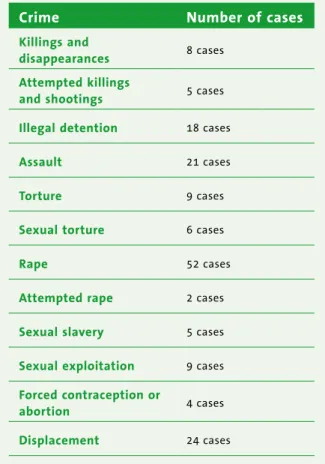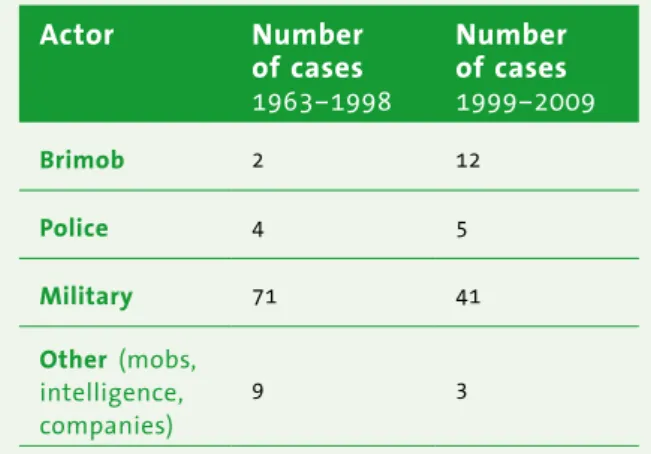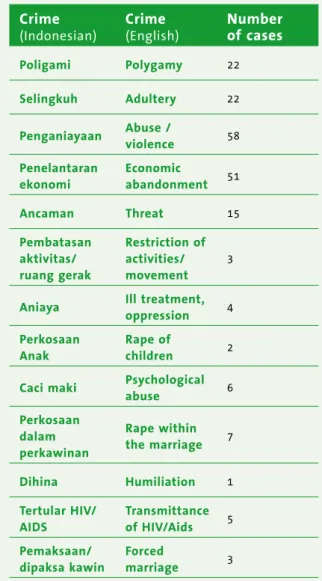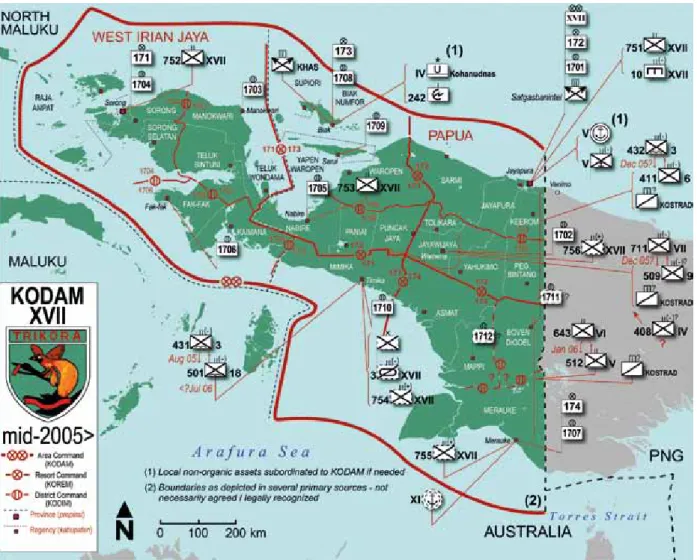Economic and political interests in Papua remain the driving force behind human rights abuses in Indonesia's easternmost region. In fact, Papuans have long suffered from human rights violations committed by the Indonesian authorities.
National and International Human Rights Standards and Instruments
However, due to pressure from civil society, human rights institutions and mechanisms were established7. What are Indonesia's human rights obligations in relation to international law. The term obligation used in the following text should be understood as a binding legal provision arising from an international instrument - such as a treaty, pact or convention - enacted by Indonesian law (eg Law No. 24 of 20028).
Indonesia’s Compliance with Internatio- nal Human Rights Obligations
98 on the Application of the Principles of the Right to Organize and Collective Bargaining, Convention No. Overall, Indonesia has responded to about 40 percent of communications to the government.
1. 3 Regional Human Rights Obligations
Although Indonesia has not yet issued standing invitations to special procedures mandate holders,25 some mandate holders have been able to visit the country anyway and report to the UN Human Rights Council on the situation of human rights defenders. human rights (in 2008),26 on torture and other cruel, inhuman or degrading treatment or punishment (2008),27 on the human rights of migrants (2007),28 and on the independence of judges and lawyers (2003).29 The rapporteur The Special on Torture has emphasized that his fact-finding mission would have been fully effective only if he had enjoyed unlimited freedom of investigation, the freedom to visit places of detention without prior notice and to privately interview detainees. While Indonesia responded to 25 communications, it did not respond to any of the 12 questionnaires sent by the Special Rapporteurs.30 Indonesia was one of the first countries to be reviewed under the UPR.31.
1. 4 Conclusions
Civil and Political Rights
The meeting discussed the current performance and the corresponding guidelines for mining activities in the region.
2. 1 Freedom of Expression
The occupation of the Papua Legislative Assembly in 2010, which demanded a referendum to resolve political uncertainty in Papua. They were questioned by the police and charged under sections 106, 107 and/or 160 of the criminal code.
2. 2 Human Rights Defenders’ Situation in Papua
In April 2011, a group of Papuan lawyers and human rights NGOs announced their intention to call for a judicial review of the makar articles59 in the Criminal Code. The amendment or repeal of all articles in the Indonesian Criminal Code that have been used to imprison individuals for their legitimate peaceful activities, including Articles 106 and 110 of the Criminal Code on 'rebellion', was also recommended in a report from June 2011 on Conflict Management in India. Indonesia prepared by the Geneva Indonesian Institute of Sciences.60. While Simon was released without charge, five other students involved in the march were charged with Makar (subversion) and sedition under Articles 106 and 160 of the Criminal Code.
Benny Giay (President of the Kemah Injil Church in Papua), Markus Haluk (Traditional Council of Papua DAP) and Agustinus Alue Alua (Chairman of the Papuan People's Council MRP) were mentioned. In these areas, monitoring and reporting is particularly dangerous due to the militarization of the areas and the absence of the rule of law.
2. 3 Torture in West Papua
Kindeman Gire and indigenous church worker Pitinus Kogoya (36) of the Evangelical Church of Indonesia GIDI (Gereja Injili di Indonesia) were severely tortured by members of the Yonif 756 infantry battalion of the Indonesian military. Gire and Pitinus Kogoya were taken to the same place where they were further tortured by members of the army. The victim asked for forgiveness, but Joko Ariwibowo strangled Marandof, punched him repeatedly in the face and ordered the continuation of the torture.
A delegation of the National Human Rights Commission (Komnas HAM) visited the site and confirmed the case. None of the perpetrators of the aforementioned cases have been brought to justice and have not been convicted of torture.
2. 4 Extrajudicial, Summary or Arbitrary executions
Economic, Social and Cultural Rights
In the specific context of Papua, attention should be paid to the right to maternal and reproductive health and the right to disease prevention, treatment and control. HIV prevalence is expected to infect a maximum of 5% of the general population in the central highlands regions and districts around the cities of Timika, Merauke and Sorong. Even if health care workers are available, they are mostly based in health centers and few of them go into the community on a regular basis.
Proper treatment is associated with foreign brands of drugs that are given in the form of vials and injections. The Indonesian government views indigenous Papuans as Indonesian citizens, representing several ethnic groups in a multi-ethnic pluralistic republic.
3. 2 MIFEE: The Merauke Integrated Food and Energy Estate
Towards a Broader View of the Politics of Global Land Grabbing: Rethinking Land Issues, Reframing Resistance. There are real fears that these changes will lead to further marginalization and impoverishment of indigenous Papuans, who will end up at the lowest rung of the economic ladder. The presence of the army often makes communities afraid to challenge businesses and file complaints.
The interests of the two groups are contradictory and it will be difficult to bridge this gap. Thanks to the monitoring activities carried out in the field, numerous examples of the issues described above have been identified.
3. 3 Palm Oil in Papua
Vulnerable Groups
4. 1 Women’s Rights in Papua and West Papua
Gender discrimination is partly rooted in Papuan custom (Adat), which is why violence against women is tolerated. Various forms of violence against women have occurred in relation to mining, oil palm plantations and other industries. They are then forced to perform sex acts on loggers and Police, and sometimes have to "service" the entire camps."142 4.
Alcoholism and unsafe sexual intercourse among young generations also contributed to the spread of the infection. Papua said that: "The poor promotion of women's rights leaves them with no bargaining power to face men, and this has contributed to the increasing prevalence of HIV/AIDS among housewives"144.

4. 2 Indigenous Peoples
In the case of the Bayabiru area, the payments were handed over to the village chief and tribal leader, who did not distribute the money to the landowning clans. Military activities in the region constitute a violation of the rights of indigenous peoples in accordance with the UN Declaration on Indigenous Peoples. One of the indigenous groups in the Merauke region most affected by the project is the Malind Arnim tribe.
Selaras Inti Semesta negotiated with only one of the six clans that held land rights in Zenegi (Zakaria, Kleden, Franky, January 2011, pp. 57 ff.). As in the case of Kaliki Village, PT Selaras Inti Semesta did not adhere to the contractual agreements.
Sources
As a result, the Malind Arnim people, who have already become a marginalized minority during the Suharto era, will be further marginalized by the realization of the MIFEE project (Zakaria, Kleden, Franky, January 2011, p. 80ff., see also Klute, November 2010, p. 19). Although central government-backed transmigration programs were halted after the Suharto era, local governments still insist on transmigration rather than taking legal measures to effectively control it. The demonstrators criticized the provincial government of West Papua, which agreed to prepare 7,000 houses for the migrants, but showed little commitment to native Papuans living in poor conditions (JPNN, March 5, 2010).
In the past, the establishment of settlements for migrants, planned and developed by the government, often resulted in the displacement of native Papuans. A mother and her child have to walk a long distance to get clean water because of the environmental damage.
4. 3 Indigenous Peoples’ Rights Violations by Freeport Indonesia
Security Sector and Human Rights in Papua
Securitization in Papua – The Implication of the Security Approach on Human Rights Conditions in Papua” by Imparsial147 clarifies the link between the security reform adopted in Papua and its impact on the human rights situation in the province. It shows that the Indonesian military in Papua is applying a security approach that leads to a wide range of human rights violations, such as intimidation, murder, terror, torture, rape and violence. Moreover, the implementation of the Special Autonomy Law in 2001 has not yet significantly changed the existing security approach.
5. 1 Background
5. 2 Implications of the presence of the Army on the Human Rights Conditions in Papua
The bitter history of years of violence and human rights violations naturally resulted in tensions and conflicts. The current security policies being implemented in Papua pose a serious threat to any improvement in the human rights situation. Several reasons for the deteriorating human rights situation in relation to militarization can be identified as follows.
The victims of human rights abuses committed by military personnel in Papua come from diverse backgrounds, from political activists to journalists to ordinary people. Those who investigate human rights cases or critically question the human rights situation are often labeled as being part of the separatist movement.
5. 4 Conclusion and Recommendations
Recommendations
The current 2010/2011 Human Rights Report on Papua indicates in no uncertain terms that an enormous effort must be made to transform the current human rights situation in Indonesia and ensure the full enjoyment of human rights by the Papuans. The following paragraphs contain the recommendations to the Government of Indonesia and its institutions, to the International Community and to the European Union and its member states.
The Indonesian government should send a standing invitation to all UN Special Procedures to strengthen its cooperation with the Special Procedures Mechanism and take advantage of their recommendations to adapt national legislation to international human rights standards, especially the recommendations of the UN Special Rapporteur on Freedom of Religion or Belief, on Freedom of Expression and opinions and for the protection of human rights in the fight against terrorism. UN Special Rapporteurs should be allowed unrestricted access to the Indonesian provinces of Papua and West Papua and the possibility of unrestricted meetings with representatives of civil society. The Indonesian government must take concrete measures to combat impunity, especially for human rights violations in the Indonesian provinces of Papua and West Papua.
In order to establish a culture of the rule of law, it is necessary to raise awareness and strengthen the competence, competence and professionalism of government officials. The human rights situation in the Indonesian provinces of Papua and West Papua requires special attention, as it is a conflict zone.
6. 2 To the International Community
In addition, the West Papua Religious Network (FBN) wants to encourage the Indonesian government to engage in open dialogue with the indigenous people of Papua regarding these outstanding issues.
6. 3 To the European Union and its Members
Franciscans International Offices
Faith Based Network on West Papua
Asian Human Rights Commission
FI New York
FI Bangkok 6th Floor, 2


